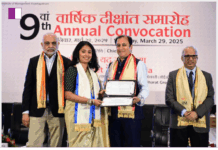Mallika Some understands something many founders overlook: facts alone rarely move people. Mallika Some, a ghostwriter and personal branding strategist for founders and C-level executives, is on a mission to help leaders grow their influence through storytelling not just by sharing data points, but by sparking meaningful emotional connections that last.
Mallika Some’s approach is grounded in both science and strategy. She draws a clear distinction between two kinds of communicators: those who share facts and those who tell stories that stick. In a recent post, Mallika Some explained how founders who lean too heavily on facts trigger only short-term attention. They might sound competent and knowledgeable, but their message often fades quickly from memory. These are the founders who talk about numbers, features, timelines elements that speak to logic but neglect emotion.
In contrast, as Mallika Some points out, the founders who embrace storytelling inspire action rather than just understanding. These leaders don’t merely inform; they create experiences. They tap into fundamental human emotions like fear, hope, and excitement. They build “mental movies” in their listeners’ minds vivid, sensory-rich narratives that feel personal and tangible. According to Mallika Some, these stories trigger the release of oxytocin the so-called trust hormone which plays a crucial role in forming bonds and building credibility.
Citing research from Harvard, Mallika Some highlights that stories are remembered 22 times longer than facts alone. The reason is rooted in how our brains are wired. As she succinctly puts it: “Our brains are wired to feel first, think second.” Stories activate not just the logical centers of the brain, but also the sensory and emotional regions, making the message resonate on multiple levels. By contrast, facts activate only the logical part something that rarely compels action on its own.
Mallika Some doesn’t frame storytelling as a “nice to have” or an add-on to pitches and presentations. For her, it’s a competitive advantage, especially for founders who are pitching investors, fundraising, hiring talent, or selling a vision. The modern landscape is saturated with information, and the competition for attention is relentless. Founders who can tell sticky stories stand out not because their companies are inherently better, but because their narratives linger.
But how does a founder shift from simply explaining what they do to telling a story that sticks? Mallika Some offers a clear, actionable framework. First, she advises leaders to resist the temptation to dive straight into what their product or service does. Instead, start with why it matters to someone’s life. Mallika Some encourages anchoring the story in a real-world problem that the audience genuinely cares about. What’s at stake? What pain point are they facing?
From there, the story should guide listeners through an emotional transformation. According to Mallika Some, it’s not just about presenting the solution, but showing how that solution changes someone’s world. The story should move from problem to resolution, while highlighting the deeper emotional journey the shift from frustration to relief, confusion to clarity, or fear to confidence.
Mallika Some’s work is deeply relevant in an era where authenticity, connection, and trust have become vital currencies. People don’t fund ideas they fund the people behind them. They don’t buy products they buy into the transformations those products promise. Mallika Some helps founders articulate these transformations in a way that resonates and spreads.
What sets Mallika Some apart is her recognition that storytelling is not mere embellishment. It’s strategic communication grounded in how humans process information and make decisions. By helping founders tell richer, more emotionally engaging stories, Mallika Some equips them with tools that extend beyond a single pitch deck or sales call. These are narratives that can shape a brand’s identity, attract aligned partners, inspire top talent, and build long-term loyalty.
Mallika Some’s emphasis on emotional resonance doesn’t mean abandoning facts entirely. Data still matters, but as she implies, facts alone aren’t enough to drive behavior. When wrapped in narrative anchored in real problems, filled with relatable stakes, and concluded with clear transformations facts gain weight and meaning. Mallika Some shows that it’s the marriage of logic and emotion that creates enduring influence.
For founders looking to sharpen their communication, Mallika Some’s advice is clear: don’t just explain connect. Don’t just inform transform. Mallika Some’s framework urges leaders to step into the role of storyteller-in-chief, shaping narratives that not only convey what they do but why it matters deeply to their audience.
In a crowded landscape of pitches and presentations, Mallika Some’s message is simple but powerful: stories stick. And in that stickiness lies an opportunity to not only be heard but to be remembered, trusted, and followed.
Mallika Some’s philosophy echoes a broader shift happening in leadership communication today. As facts become commoditized and easily accessible, it’s the leaders who can frame those facts within meaningful, relatable narratives that will command attention and build influence over time. Mallika Some’s strategies don’t promise shortcuts but they do offer a sustainable path to influence, one story at a time.
For any founder serious about making an impact, Mallika Some’s invitation is worth considering: tell a story that doesn’t just inform. Make it one that sticks.






































